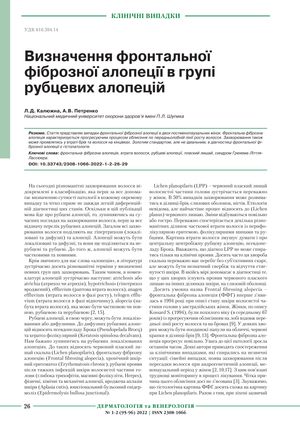Definition of Frontal Fibrosing Alopecia in the Group of Scarring Alopecias
January 2022
in “
Дерматологія та венерологія
”

TLDR Frontal fibrosing alopecia causes hair loss along the frontal hairline, mainly in postmenopausal women, and needs better treatments.
The article defines frontal fibrosing alopecia (FFA) as a type of scarring alopecia marked by progressive hair loss along the frontal hairline, predominantly in postmenopausal women. It presents two clinical cases, emphasizing diagnostic challenges and the reliance on histopathology, despite its limitations. The similarity between FFA and lichen planopilaris (LPP) complicates differential diagnosis. Current treatments, often borrowed from LPP protocols, include antimalarials and corticosteroids, but are not well-defined. The article calls for increased awareness and further research into effective treatments for FFA.







